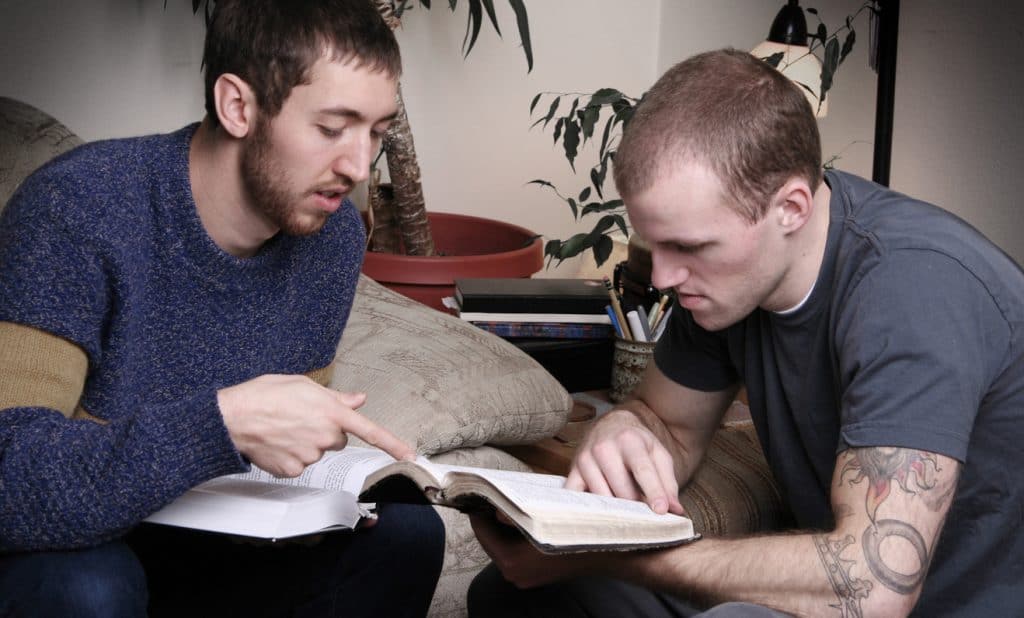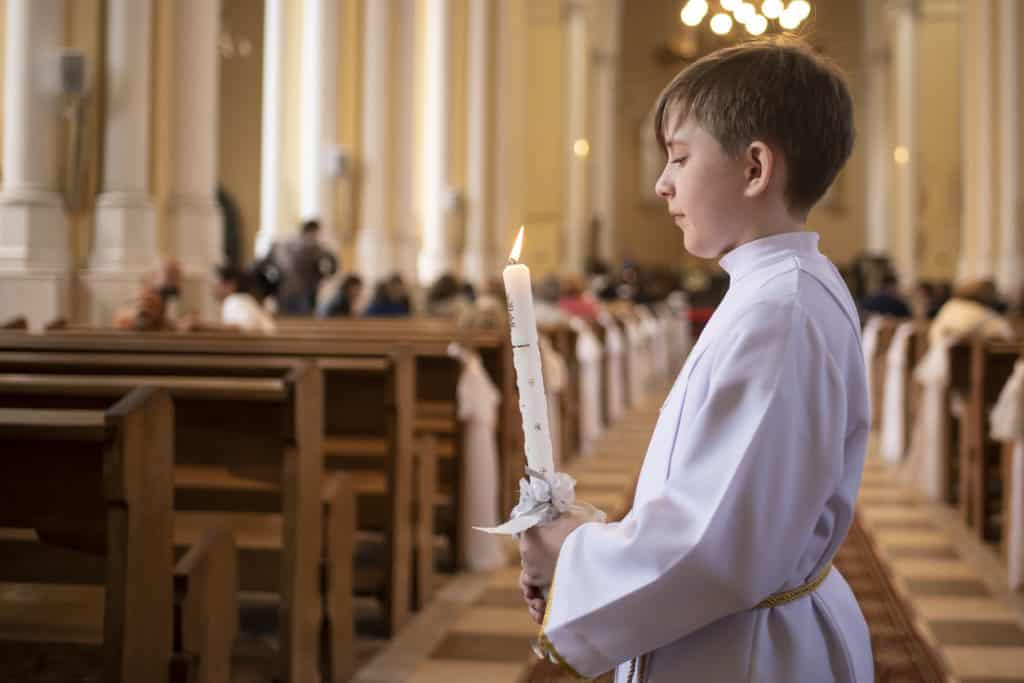Remember when you would misbehave as a kid? Maybe you were jumping on your parents’ bed. Maybe you took all of the marshmallows out of the brand new box of SuperSugarBlast cereal. Perhaps you were too loud, too lazy, or too mean to your siblings on the drive to your grandparents’ house. Then your mom would turn around in the front seat of the car and say “When we get in there, you BEHAVE yourself!”
Let’s pause and think for a moment about how the imperative “BEHAVE” landed on your heart? Did it feel like a wet blanket? A short ceiling on what a second ago felt like limitless skies of fun? Did you equate “behave” with boring? Did it feel like sitting in your grandparent’s non-kid-friendly house on a fancy couch with lots of fancy pillows that you were only allowed to look at and not throw? Was the snack you were given some weird multigrain cracker on a little napkin without an ounce of sugar in the place?
Behaving During Lent and Beyond
Well now, Mother Church is taking us to Lent once again. And we might imagine She’s saying, “When we get in there, you BEHAVE yourself!”
Just as the word ”behave” can evoke certain negative reactions, so too might Lent conjure up for us certain pejorative feelings.
- Lent = letting go of bad habits and increasing good practices, but that’s so much work!
- Lent = fasting and abstaining from certain legitimate pleasures. Boooo.
- Lent = praying more and reading more Scripture. Oh man, more stuff I have to do!
Lent is in fact the time to behave ourselves, but really no more than at any other time in an integrated human life. To behave literally means to act accordingly towards God and others.
Why should we do that? Well, because it’s in your best interests to do so! Saint Thomas Aquinas, one of the most brilliant theologians who ever lived, once said that to sin (that’s behaving badly) is to “go against one’s nature.” That doesn’t sound good. When something goes against its nature, it’s generally a fast track to implosion, corruption, and self-destruction.
All of our struggles with pornography, masturbation, infidelity to a spouse, and the list goes on…all of these self-pleasing, self-gratifying acts have been acts against our nature. Let’s ask ourselves how these acts of misbehaving landed on our hearts? How did it feel to go against our nature, which is inherently designed by God not to be self-centered or hedonistic but other-centered, altruistic? We felt the chains of compulsion, addiction, and shame, and we lost the taste of freedom and self-mastery.
But, Why Is It So Hard?
To behave ourselves, then, isn’t meant to be that wet blanket on fun or a framework of stricture that descends upon our freedom. To behave is to be set right again in the proper direction of love. To behave is to be human—to act according to our nature. To behave is to be His!
Ok. This sounds right. Thanks for clarifying, Bill. It behooves us to behave during Lent (and in every other season of life) because we’re ordered to the ultimate good that is Love—of God and neighbor and our own inherent goodness. But, I have a quick question: why is it still so hard? I get the intellectual piece. It’s logical. But from whence comes the grind, the friction of flesh meeting spirit as one descends towards self-pleasure (i.e., through porn or self-pleasuring oneself), even as the other is reaching for the Infinite?
It’s the battle born from Eden, waged now in everyone’s hearts, lo these many millennia. The spirit is willing, but the flesh is weak. The good I long to do, I don’t do. I do the evil I do not want to do. It’s so hard because we’ve become so divided.
In a book with an amazing title, “Love in the Ruins: The Adventures of a Bad Catholic at a Time Near the End of the World”, the novelist Walker Percy once wrote:
“For the world is broken, sundered, busted down the middle, self ripped from self and man pasted back together as a mythical monster, half angel, half beast, but no man.”
What (or Who) then can reconstitute and recalibrate us so that we can stop misbehaving? The Spirit of God hovers over these troubled waters. The Spirit of God longs to descend again into this turbulent space and bring peace. The Lord Jesus longs to stretch out his hand again over the troubled seas of our misbehaviors and misdirection and establish calm.
Three Steps to Behaving and Believing
Lent is a specific and concentrated stretch of days that can help us get out of our daze through an intentional desire to grow closer to the Lord. The way out and the way back into a right way of behaving and believing have three steps. These three ways are a classic model revealed in the early life of the Church through which we become not only holier but happier. They are the purgative, the illuminative, and the unitive way.
Saint John Paul II speaks of them in one of the last books written in his life, Memory and Identity (MI). “In reality, these are not three distinct ways,” he said, “but three aspects of the same way, along which Christ calls everyone, as he once called the young man in the Gospel.”
1. The Purgative Way
The purgative way consists in our “… observance of the commandments, properly understood… it means conquering sin, moral evil in its various guises. And this leads to gradual inner purification” (Saint John Paul II, MI). It is in this phase that our desires to misbehave are still rather raw and untamed. We need the objective commandments and the pricks of conscience to provoke us into this kind of purification. Moving through the purgative way with the will to do the right thing doesn’t always feel good but objectively speaking it is good. It is essential to move through this way if we are to taste the freedom of the life of virtue.
Here I want to mention the incredible help that Covenant Eyes can be and has been for so many people! It’s the process of purification and redirection of our passions from a self-pleasing model to one of self-giving. If we stick to the plan and hold ourselves accountable with this tool, that purification can begin and we will begin to literally “see the light.” This is the second path, the illuminative way.
2. The Illuminative Way
In the illuminative way, our misdirected desires, bad habits, and sins begin a realignment towards the good, the true, and the beautiful. As Saint John Paul II writes:
“The purgative way leads organically into the illuminative way. Values are lights which illuminate existence and, as we work on our lives, they shine ever more brightly on the horizon. So side by side with observance of the commandments—which has an essentially purgative meaning—we develop virtues. For example, in observing the commandment: ‘You shall not kill!’ we discover the value of life under various aspects and we learn an ever deeper respect for it. In observing the commandment: ‘You shall not commit adultery!’ we acquire the virtue of purity, and this means that we come to an ever greater awareness of the gratuitous beauty of the human body, of masculinity and femininity. This gratuitous beauty becomes a light for our actions…” (St. John Paul II, MI)
Imagine the gift of seeing the body rightly? Imagine after our struggles with porn, sex addiction, and the futile attempts at satisfying ourselves with the pleasures of sex, we finally begin to see the opposite sex and our own as windows into the mystery of the love of God!? Lord grant us your healing! You made the body in Your image and likeness. You called the first man and woman into a beautiful union that images Your desire for union with us. Lord let this healing vision seep into our very bones. Lord give us this light to see the body rightly!
3. The Unitive Way
Finally, as we passed through the purgative way and clean up our act, move through the illuminative way and finally see the light, we reach the unitive way, which is when we realize that our good behavior is not meant just to be rewarded, but is meant to lead to bliss and beatitude. This is so important to understand. The heaven of love that awaits us isn’t just kudos for good behavior. To quote back to Saint Thomas Aquinas, heaven is where we experience the fullness of living according to our nature. In the unitive way, the heart and mind and body are rightly aligned to the infinite again, to the true home of our hearts and the place where our natural inclinations finally encounter their supernatural destiny and destination.
To return to this great master of the spiritual life, who himself passed through so many Lenten seasons in his own lifetime (85 to be exact), Saint John Paul II writes:
“The purgative way and then the illuminative way form the organic introduction to what is known as the unitive way. This is the final stage of the interior journey, when the soul experiences a special union with God… (To the degree that we enter this unitive way we) can find God in everything, we can commune with him in and through all things. Created things cease to be a danger for us as once they were, particularly while we were still at the purgative stage of our journey. Creation, and other people in particular, not only regain their true light, given to them by God the Creator, but, so to speak, they lead us to God himself, in the way that he willed to reveal himself to us: as Father, Redeemer, and Spouse.”
Let’s Enter This “Way” Now
With all of this glory in mind as the end game of Lent and the glorious crown of what Easter means for our own wounded human nature, let’s enter this Way now. Come, Lord Jesus, be our inspiration for the journey and our guiding light in the dark night. Awaken us to the fact that our behavior in your light can become a benediction! Lord, You can make us whole! Amen.








0 comments.